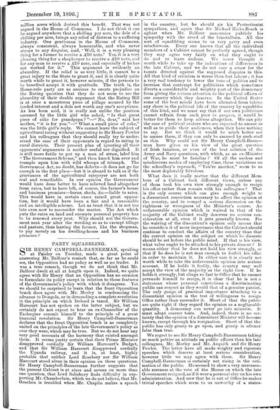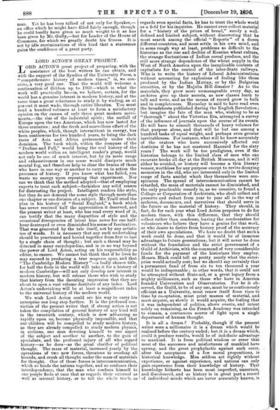PARTY SQUABBLING.
SIR HENRY CAMPBELL-BANNERMAN, speaking at Paisley on Tuesday, made a great point of answering Mr. Balfour's remark that, so far as he could see, the Opposition had no policy as well as no leader. It was a true remark, though we do not think that Mr. Balfour dwelt at all at length upon it. Indeed, we quite agree with Sir Henry that an Opposition has no occasion to formulate its policy except in relation to those features of the Government's policy with which it disagrees. Yet we should be surprised to learn that the front Opposition bench does agree with Mr. Morley in condemning the advance to Dongola, or in demanding a complete revolution in the principle on which Ireland is taxed. Sir William Harcourt has not spoken on the latter subject, but we certainly do not expect to hear an ex-Chancellor of the Exchequer commit himself to the principle of a great financial revolution. Sir Henry Campbell-Bannerman declares that the front Opposition bench is as completely united on the principles of the late Government's policy as ever they were, which may be true. But we do not hear any very good accounts of the harmony that existed amongst them. It seems pretty certain that their Prime Minister disapproved cordially Sir William Harcourt's Budget, and that Sir William Harcourt disapproved cordially the Uganda railway, and it is, at least, highly probable that neither Lord Rosebery nor Sir William Harcourt stood alone in their opinion on these questions. Sir Henry Campbell-Bannerman further suggests that the present Cabinet is at sixes and sevens on more than one question, that Lord Salisbury finds difficulty in sup- porting Mr. Chamberlain, which we do not believe, that Mr. Goschen is troubled when Mr. Chaplin makes a speech in the country, lest he should air his Protectionist sympathies, and again that Sir Michael Hicks-Beach is aghast when Mr. Balfour announces publicly his sympathy with the creed of the bimetallists. All this sort of squabbling seems to us very petty and even mischievous. Every one knows that all the individual members of a Cabinet cannot be perfectly agreed, though they may agree very fairly on what they ought to do and to leave undone. We never thought it worth while to take up the indications of differences in the late Cabinet, and we do not care a straw for the taunts directed against the supposed disputes in this. All that kind of criticism is worse than lost labour ; it has a very real tendency to lower the tone of politics and to increase that contempt for politicians which sometimes diverts a considerable and weighty part of the democracy from giving the serious attention to the political affairs of our country which they deserve. In the United States some of the best minds have been alienated from taking any share in the political life of the country by squabbles of this kind, and we must say that if our own politicians cannot refrain from such poor tu quo ques, it would be better for them to keep silence altogether. We can pity the case of political orators who are expected to amuse as well as to guide their audiences, when they have nothing to say. But we think it would be much better not to amuse them, if they can only be amused by such stuff as this. Why could not Sir Henry Campbell-Banner- man have given us his view of the great question of Irish taxation, or even of the best solution of the Army and Navy questions, with which, as an ex-Minister of War, he must be familiar ? Of all the useless and mischievous modes of employing time, these variations on the schoolboy's reproach, "You're another," seem to us the most deplorably frivolous.
What does it really matter that the different Mem- bers of a Cabinet took different views, unless any of them took his own view strongly enough to resign his office rather than remain with his colleagues ? That is the only course which can give enough weight to a dissentient conviction necessary to affect the opinion of the country, and to compel a serious discussion on the rightness or wrongness of the Minister's course. An unfavourable opinion which is waived to that of the majority of the Cabinet really deserves no serious con- sideration at all, even if it gets generally known. For the waiving of the dissentient's opinion only means that he conside:s it of more importance that the Cabinet should continue to conduct the affairs of the country than that the correct opinion on the subject on which he dissents should be set before the public mind. If that is his view, what value ought to be attached to his private dissent ? It means either that he does not hold his view strongly, or that if he does he is not man enough to forfeit his office in order to maintain it. In either case it is clearly not worth while to take the unfavourable opinion into serious account. If he holds it feebly, the country may well accept the view of the majority as the right view. If he holds it strongly, but clings so fast to Office that he cannot persuade himself to resign, it is clear that he is not a statesman whose personal convictions a discriminating public can respect as they would that of a genuine patriot.
The only gauge of practical importance attaching to a dissentient opinion is the test of willingness to resign Office rather than surrender it. Short of that the public are quite right if they regard the opinion as a negligeable quantity. A democracy can never go into minutize. It must adopt coarser tests. And, indeed, there is no cer- tainty that the opinion of a dissentient Minister will become known, except through his resignation. Short of that the public has only gossip to go upon, and gossip is oftener false than true.
We regret to see Sir Henry Campbell-Bannerman taking so much pettier an attitude on public affairs than his late colleagues, Mr. Morley and Mr. Asquith and Sir Henry Fowler. The latter have all made weighty and vigoroua speeches which deserve at least serious consideration, however little we may agree with them. Sir Henry Campbell-Bannerman is certainly not rising in the esti- mation of the public. He seemed to show a very unreason- able soreness at the vote of the House on which the late Government resigned, as if it were a personal slur on his own administration. And now that he is out of Office he makes trivial speeches which seem to us unworthy of a states- man. Yet he has been talked of not only for Speaker,— an office which he might have filled fairly enough, though he could hardly have given so much weight to it as has been given by Mr. Gully,—but for Leader of the House of Commons, for which we greatly doubt his fitness. It is not by idle recriminations of this kind that a statesman gains the confidence of a great party.











































 Previous page
Previous page